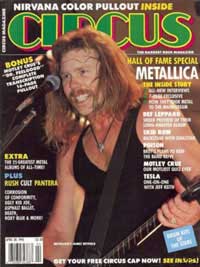Rush Relives 18 Years Of Wide-Screen Rock
By Dan Hedges, Circus, April 30, 1992

LOS ANGELES, CALIFORNIA
"I was looking at some old circus magazines recently," guitarist alex lifeson says, backstage at the great western forum. "Some must have been from the 70's. It seems so long ago. The guy with the guitar in the photos..." He laughs. "I kept thinking, 'Who is he?' He looked so skinny. So young."
Mind you, Lifeson was three years old at the time - or at least that's what he'd like you to think. Through seventeen Rush albums and a million tours, he's amazed at how time has flown.
Don't write off Rush's progressive, wide-screen rock as a sonic antique, though. The fact is, Roll The Bones (their latest album) is beyond platinum. Their current tour is pulling sell-out crowds.
But then, few bands have such a fanatical following. Here in L.A., the three Canadians have packed the cavernous Forum for two nights, at a time when many touring acts are losing their shirts. For most of the crowd, after all, Rush has never been a mere alternative to TV. For them, Rush is closer to religion.
Geddy Lee is still among the most powerful bassists in rock. Love it, hate it, his banshee voice sounds like no one else's. Onstage, as he and his bandmates reach back to their '74 debut, Rush, and classic LPs like A Farewell To Kings, Hemispheres, Permanent Waves, and Moving Pictures, they seem proud of where they've been.
Are the old songs better? Honestly, yes. Whether you're talking about the turbulent "Limelight" and "Free Will" or the Iyrical power of "Tom Sawyer" and "Closer To The Heart," the crowd knows every word. That's not to say that the new stuff doesn't cut it. But even in the midst of "Dreamline," "Bravado," or "Ghost Of A Chance," Rush seems less concerned with hustling the new than plotting a show that spotlights their best.
Neil Peart's precise stickwork has influenced countless drummers. During the fiery "Force Ten," "Time Stands Still," and "Show Don't Tell," he proves the accolades are justified. As for Alex Lifeson's cathedral strength fretwork during the likes of "Subdivisions," "Superconductor, " and "The Big Money"... Put it this way: the man makes full use of every piece of gear he owns.
That's what's impressive about Rush in '92 - that three can sound like ten without posing, pandering to idiots, or relying on the sort of tattoo-powered stage tantrums that can send an audience home with an angry taste in their mouths.
Lee, Lifeson. and Peart just get up and play. And by the time they finish with back-to-back salvos of "The Spirit of Radio," "Finding My Way," "La Villa Strangiato," and "Red Barchetta," it's clear that the Forum crowd wouldn't have wanted it any other way.
As Alex Lifeson says, "We don't care about certain things, to be part of that posing rock scene. This band's been together since 1968, when Geddy and I started it. We've been doing this since we were fifteen. It's made a difference that we're Canadian. Our natures are different from Americans, so we tend to be a little more flexible.
"But we've never felt the need to be anything we're not. We hang around together, we laugh and goof around. It's one thing to be working partners, but we're friends, too. And that's made all the difference in the world."